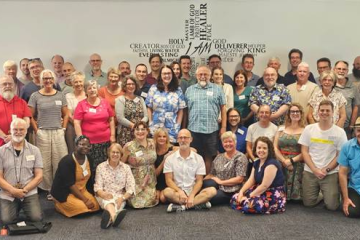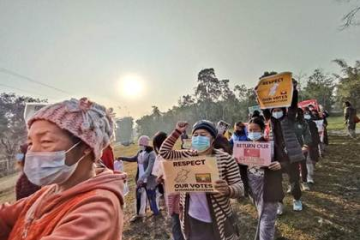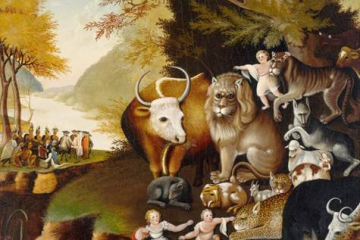You make all things new – 1 Samuel 1:3-20, Luke 4:16-30
The promise, ‘you make all things new, you make all things new…’ that we sang earlier comes from Revelations 21 alongside other promises that one day God will be intimately known by God’s people (“See the home of God is among mortals. He will dwell with them as their God, they will be his peoples…”), that suffering, and death will be no more; that the thirsty will drink at the waters of life. In other words that after barrenness, life will flourish! It is a hope that runs through the whole of the biblical tradition and up to the present moment, and it connects the stories we have been hearing this week and last week (and during the week if you follow the lectionary), the stories of Ruth and Naomi, of Hannah and even the widow of Zarephath.
Each of their stories tell of the painful reality of barrenness. As Naomi says in Ruth chapter 1, “I went away full, but the Lord has brought me back empty.” Hannah cries out to God and weeps bitterly because she has no child, bringing, not only grief, but shame in the ancient world. The widow of Zarephath is on the brink of starvation when she takes in the prophet Elijah and then her only child also dies. But these stories also tell of people who do not accept these situations, but who cry out to God, who act, who demonstrate great faith and faithfulness by holding onto the promise that God is making all things new.
The first thing Hannah does is acknowledge the barrenness of her experience.
Every year, as we heard, Elkanah made the journey with his household to Shiloh to worship and sacrifice to God. (The text notes that this is where the sons of Eli served as priests – a detail that becomes significant later.) And it is here, at this place of worship, where year after year, Peninnah, Elkanah’s other wife who had children, would provoke Hannah severely because she had no child. The location is significant because “barrenness” was not just a woman’s problem, a physical failure, but it was a sign of spiritual failure. It is truly devastating when abuse that takes place within a spiritual context. And Elkanah’s response is then deeply inadequate. His expression of love only exaggerates his value – “Am I not more to you than ten sons?” – while belittling Hannah’s deep emotional and spiritual grief.
But Hannah refuses to be comforted.
We too need the courage to face the depth of grief – our own grief or others’ grief – the true awfulness of a situation before we can begin to appropriately respond. If we make assumptions – as Peninnah does – “You are in this situation through your own fault” or trivialise the pain – as Elkanah does, we miss the opportunity to participate in the new thing God is doing.
Last Saturday night we were at a friend’s 50th birthday party, but seventeen years ago we went to the funeral for his child, a little boy who only lived only a few hours after birth. And at the funeral our friend said this: Hugh…I want you to know that I grieve your death. I think on the day of your birth and death I cried more tears than I have in my 32 years. I have never felt so sad. You were such a beautiful little boy. As well as having these feelings I also felt some solidarity (in a very limited way) with the many thousands of people around the world who lose their children every day, the difference being that most parents lose their children from things that can be prevented….I want to remember as I grieve that to not work against the injustice of the world is to somehow admit that your life is of greater value than other children….Your time with me has changed me and I want it to be ultimately for good – the common good.
As I looked around at the group gathered on Saturday night, and listened to the speeches, it struck me that in so many ways – not overly dramatic ways or inconsistent ways – but in so many ways that terrible experience of barrenness, of loss, had led to new life, and to abundance for others. It has led to common good.
And the story of Hannah is not just a personal story of grief that turns to joy, but a story of newness that brings life to all Israel. Life was barren in Israel and the outlook was bleak. This was the end of the time of the Judges and there were external threats from the Philistines and internal threats from erratic and localised leadership – Judges 21:25 by saying, everyone, “did what was right in their own eyes.” – and a corrupt priesthood. Hophni and Phinehas, the sons of Eli, mentioned earlier, “were scoundrels”, with no regard for God or for the people, we’re told in chapter 2.
Hannah’s grief and refusal to accept the status quo then, is not just personal. It is political. She demonstrates prophetic action when she commits her child to be a nazirite – one that is especially set apart and dedicated to God.
The first step toward newness is acknowledging the old and committing to being part of what God is doing.
Secondly, we hear again in this story that, as the song said, this newness begins in places we wouldn’t choose, among people we wouldn’t choose…
Hannah is the least likely candidate to bring about the salvation of Israel. She is a woman. She is spiritually suspect as she is barren. And when she goes to the temple and prays, Eli the priest assumes that she is drunk! That it is more likely, he thinks, that she is drunk than deep in prayer reveals a lot about temple life, but also about attitudes to women.
Thankfully, however, he has the wisdom and grace to acknowledge her prayer and bless her. And Hannah goes away in confidence, even before she is with child, knowing God has listened to her; that God has heard her. There’s an interesting twist at the end of our reading because it is Hannah – not Elkanah – who names the child, and although she says his name means “I asked him of the Lord,” ‘Samuel’ actually means, ‘God heard.’ Yes, she boldly opened her heart to God, but even more boldly she makes the claim that God has listened to her and chosen her to be part of this new thing.
We should expect God to use the unexpected by now, and yet we are often like those in the synagogue in Nazareth hearing Jesus read the words of Isaiah. We want this new thing – this good news – this release and recovery and freedom – but we on our terms; focused on us, directed where we would direct it, following our systems of value. And Jesus knows this is what they – we – are thinking, and finds the sore point and pokes it! It is not just an insult that the widow of Zarephath and Naaman the Syrian were foreigners, it is the heresy of saying that foreigners were the ones who showed faith, the faithful ones, whose lives God worked through and made something new.
The story of Ruth too features this heresy – that it is a foreigner who utters extraordinary words of faithfulness and faith – a faith she acknowledges is not originally her own.
Do you remember the film Amistad? It was a Steve Spielberg retelling of the true story of Mende tribesmen from Africa who in 1839 seized control of the slave ship, La Amistad, which was transporting them to the new world. The ship was then recaptured by a US government vessel and the men were imprisoned and tried.
As they await the judge’s verdict in the film one of the men, Yamba, sits in a corner of the prison cell thumbing through the pages of a bible.
Cinque, the leader of the group, says, “You don’t have to pretend to be interested in that. Nobody is watching.”
“I’m not pretending,” Yamba says, “I’m beginning to understand it.” He cannot read it – none of them spoke or read English – but he has been looking at the illustrations. Cinque comes over to see for himself. “You see, their people have suffered more than ours,” Yamba says showing Cinque a picture of Jews being attacked by lions. “Their lives were full of suffering.”
He flips the page and points to a picture of the baby Jesus, “Then he was born and everything changed.”
“Who is he?” Cinque asks
“I don’t know, but he must be special.” He points to a picture of Jesus riding on a donkey and being greeted by the people, Jesus’ healing people, Jesus protecting an outcast woman, Jesus embracing children. “But something happened. He was captured, accused of some crime.”
“He must have done something,” Cinque says.
“Why?” Yamba says. “What did we do? Do you want to see how they killed him?”
He starts weeping and Cinque says to him, “This is just a story, Yamba.”
“No,” says Yamba. This man’s death has become real for him. “But look” he says. “That’s not the end of it. His people took his body down from…” he pauses and draws a cross in the air. “They took him into a cave. They wrapped him in cloth, like we do. They thought he was dead, but he appeared before his people again…and he spoke to them. Then, finally, he rose into the sky….if they kill us that is where we are going.”
God chooses those we wouldn’t choose – those who are weak, those who are outsiders, those who are regarded as spiritually suspect – to be part of God’s salvation.
And – hallelu hallelujah! – we are among them!
1 Corinthians, chapter 1 says; “Consider your own call, brothers and sisters… God chose what is foolish in the world to shame the wise; God chose what is weak in the world to shame the strong; God chose what is low and despised in the world, things that are not, to reduce to nothing things that are….[God] is the source of your life in Christ Jesus, who became for us wisdom from God, and righteousness and sanctification and redemption…”
We, too, know barrenness – a world facing the external threats of climate change, of the pandemic and the internal threats of inconsistent leadership, of self-interest, of corruption, of greed that continues to divide rich and poor, conflict that tears communities apart. And there is our personal barrenness; the hopes that have not come to fruition, the losses we have experienced, the emptiness we know.
We need to have places where we face this barrenness, where we refuse to be comforted or distracted from the depth of our grief, knowing, like Hannah, we can bring our concerns honestly and boldly to God and that God will listen to us; that God will hear us.
Hallulu hallelujah! God is making all things new and God has chosen us to be part of God’s great work of salvation. Let us pray, “Lord, hear our prayers… and let your kingdom come.”


